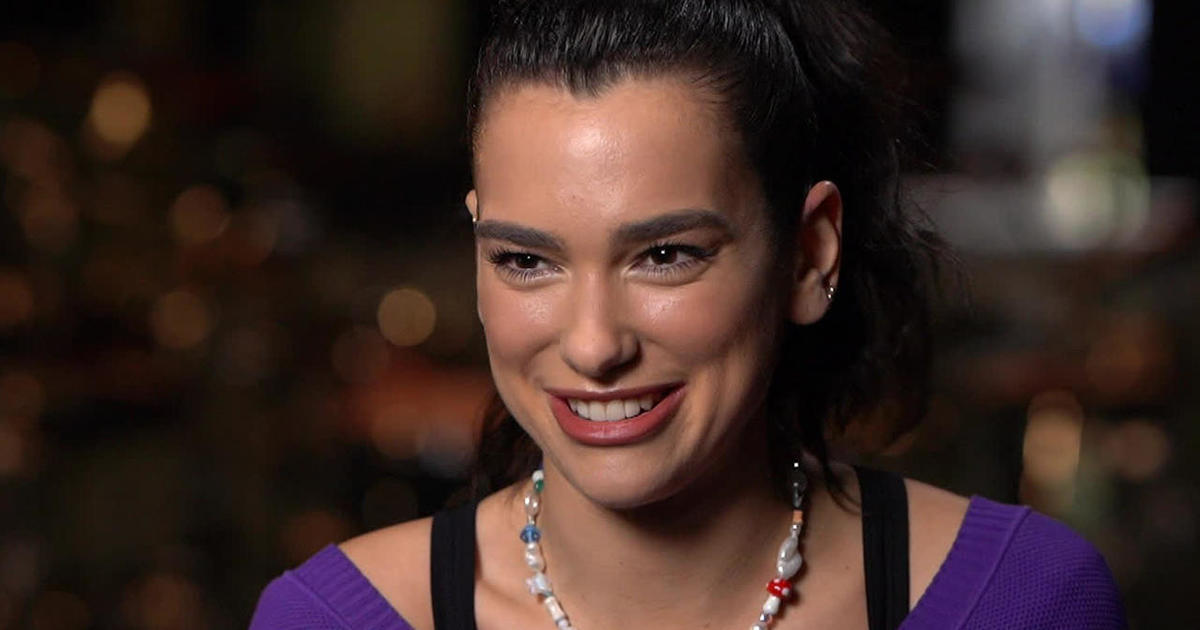“I kind of set off jokingly being like, well, ‘I’m setting off for world domination, that’s my plan!'” laughed Dua Lipa.
It turned out the pop star’s plan for “world domination” was no joke. Her self-titled debut album has been streamed more than 7 billion times on Spotify. It also earned her two Grammys.
And last week, the 25-year-old picked up half a dozen more Grammy nominations, for her second album, “Future Nostalgia,” released just as coronavirus lockdowns began.
Correspondent Roxana Saberi asked, “You came out with this album that’s full of dance hits. And yet, a lot of people are stuck at home during this pandemic.”
“I mean, never in a million years did I think I’d have to put a record out during a time like this,” Lipa replied, “and I’d be lying if I said I wasn’t scared to put it out to begin with.”
Dua Lipa performs “Levitating,” from her album “Future Nostalgia,” at the American Music Awards:
Dua Lipa – ‘Levitating’ at the AMAs 2020
YouTube
by on YouTube
Instead of performing the hit record live around the world as planned, the singer has mostly been stuck at home, like the rest of us.
Saberi Zoomed with her last spring, while under lockdown in London. “I try and, like, wake up, do a workout,” Lipa said. “Read my book, early dinner, and, uh, watch movie.” Hardly the schedule of a global superstar with a new album.
After the pandemic postponed her world tour a second time, Lipa came up with the next best thing: Isolating with a crew of dancers and musicians, rehearsing for a virtual, live-streamed performance.
Dua Lipa in rehearsal for her live-streamed concert.
CBS News
“We all get to be together in a very safe environment,” she said. “And that’s probably as close to a performance as we’re going to get right now.”
More than five million people tuned in.
Lipa has been performing since she was a child. Even her given name sounds hand-picked for pop stardom. It’s actually Albanian. Her parents are Kosovar-Albanians who fled their war-torn homeland in the 1990s.
Lipa was born in England, but the family returned to Kosovo when she was 11.
“The impact of war, it’s devastating, and I really became very much, like, in touch with my roots and understanding things in a completely different light,” she said.
Last year she traveled to Lebanon with UNICEF, to bring attention to children displaced by the war in Syria. “I really felt that duality of, like, being from two places at the same time,” she said.
The singer-songwriter just received 6 Grammy nominations for her latest album, “Future Nostalgia,” a collection of dance hits released just as lockdowns began, which has become a soundtrack to her fans’ isolation.
CBS News
When Lipa was 15, she moved back to London: “I was like, I want to do music, but I want to do it on a global scale. I have to go back to where everything is happening.”
She convinced her parents, Dukagjin and Anesa, to let her go, alone, while they stayed in Kosovo.
Saberi asked them, “How did that conversation go?”
“Quite a one-way street, one-way conversation,” Dukagjin said.
“Even I think she planned this all this thing to happen,” Anesa said. “It was her destiny, yeah.”
Dua said, “I’m quite persuasive, clearly! My parents were still just, like, ‘What are you doing? Like, are you sure this is what you want to do?’ And I was just like, ‘Yeah, I’m just going to keep going.'”
At age 21, “New Rules,” an anthem to women’s empowerment, helped catapult Lipa to fame:
Dua Lipa – New Rules (Official Music Video)
YouTube
by on YouTube
“Obviously I dreamt for it to do well,” Lipa said. “I just never thought that that would happen with my first record. It really did, like, completely exceed all my expectations.”
But then came the expectation to live up to that early success: “Lots of people, or at least in my head lots of people made me feel like I was a little bit undeserving of it or something.”
Saberi asked, “Is there more pressure on you having been a young woman especially?”
“100 percent. As a female artist, especially in the pop genre, people immediately think that you’re manufactured. No one believes that you write these songs yourself. We’re met almost with so much more criticism in terms of, like, what we wear, what we’re doing, what the performance looks like, how we’re dancing, how we’re singing, if we’re singing.”
“How did you deal with that pressure?” asked Saberi.
“It was creating an album that served as a form of escapism,” Lipa said. “I really wanted to solidify myself in this industry and show people that it’s not just a one-time thing.”
You can stream Dua Lipa’s album “Future Nostalgia” (Warner Records) by clicking on the embed below (Free Spotify registration required to hear the tracks in full):
For more info:
Story produced by Mikaela Bufao. Editor: Brian Robbins.
